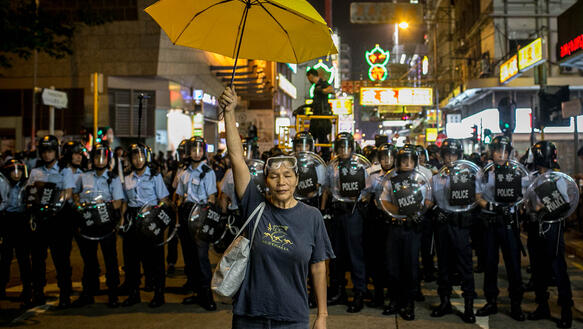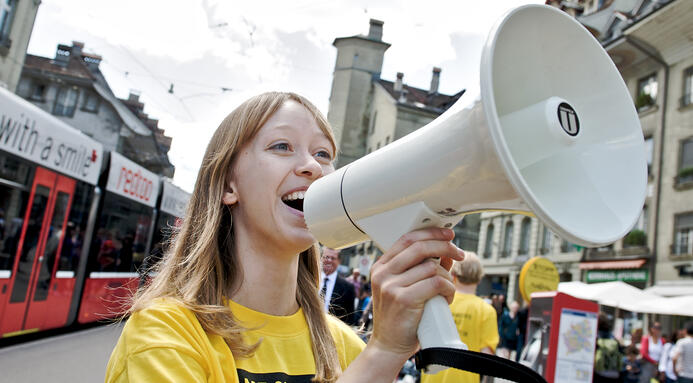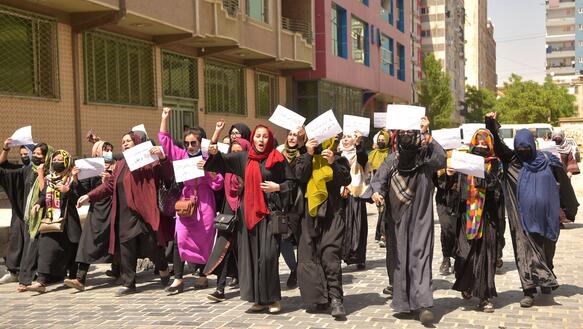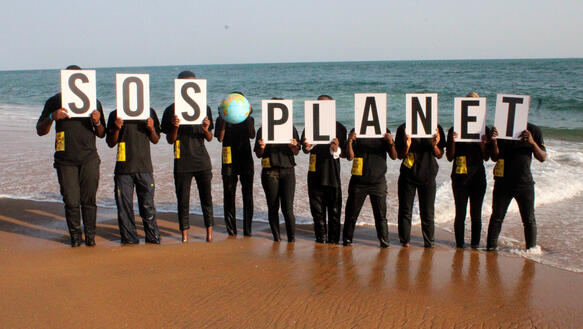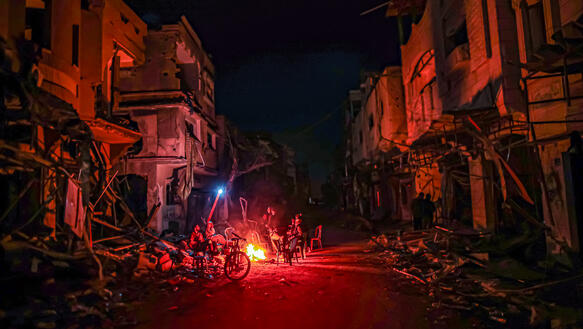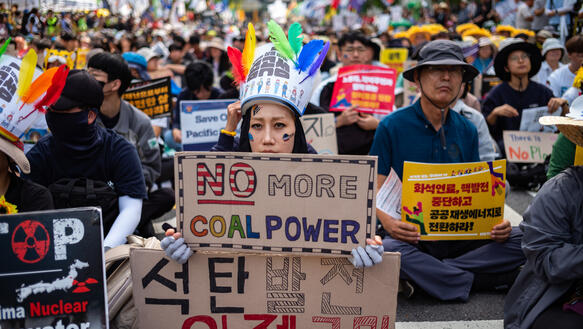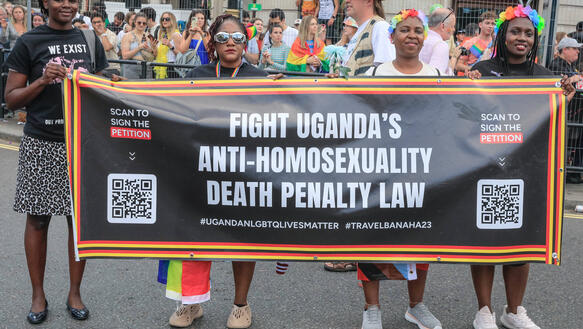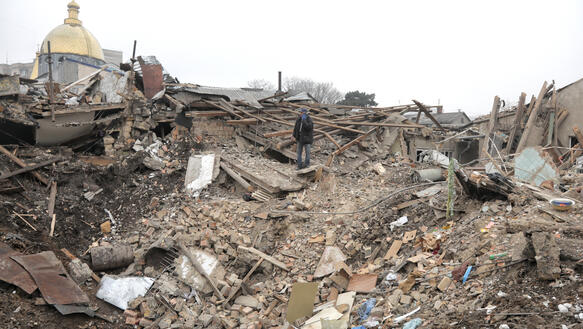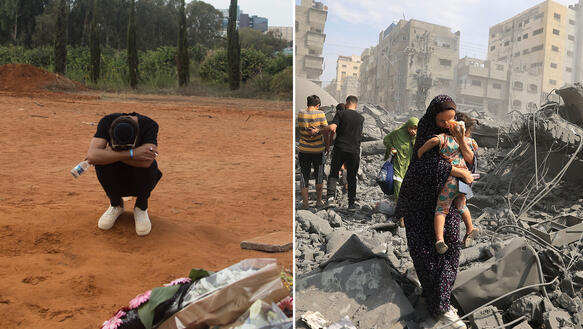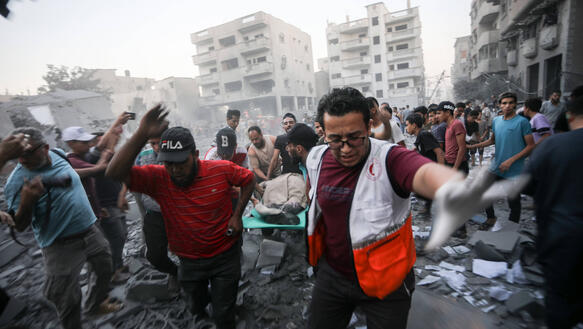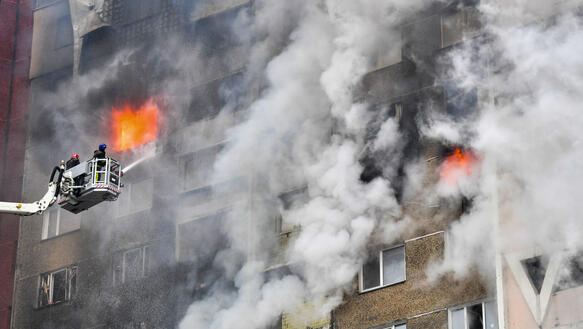DEINE SPENDE KANN LEBEN RETTEN!
Mit Amnesty kannst du dort helfen, wo es am dringendsten nötig ist.
DEINE SPENDE WIRKT!
Ukraine: Zukunft der Kinder in den besetzten Gebieten in Gefahr, da Schulbildung stark eingeschränkt
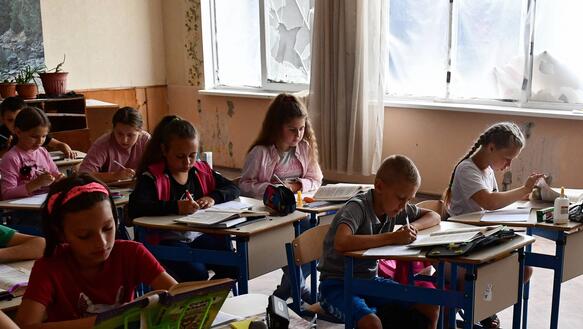
Unterricht in einer Schule in der von Russland besetzten ukrainischen Stadt Mariupol (26. Juni 2022)
© IMAGO / SNA
Familien in russisch besetzten Gebieten der Ukraine, die die ukrainische Schulbildung ihrer Kinder fortsetzen wollen, sind der Gefahr brutaler Vergeltungsmaßnahmen ausgesetzt. Einige Eltern haben ihre Kinder versteckt, um zu verhindern, dass diese in "Umerziehungsheime" verbracht, zur Adoption nach Russland verschleppt oder zwangsweise in Schulen eingeschult werden, die nach dem russischen Lehrplan unterrichten. Amnesty International hat Beweise von 23 Angestellten im Bildungsbereich und 16 Familien mit Schulkindern gesammelt, die unter russischer Besatzung leben oder gelebt haben.
Janine Uhlmannsiek, Expertin für Europa und Zentralasien bei Amnesty International in Deutschland, sagt:
"Der völkerrechtswidrige russische Angriffskrieg hat zu einer weit verbreiteten Unterbrechung der Schulbildung in der Ukraine geführt. In russisch besetzten Gebieten der Ukraine gehören Einschüchterung und Zwang für Familien, Kinder und Lehrkräfte zum Alltag. Auch während Krieg und Besatzung müssen internationale Menschenrechtsnormen geachtet werden. Dazu gehört das Recht der Kinder auf Zugang zu guter Bildung. Der einzige Weg, ukrainische Kinder wirksam zu schützen, ist ein Ende des Angriffskrieges durch Russland."
Hier die vollständige Original-Pressemitteilung auf Englisch:
Ukraine/Russia: Children’s futures under attack as Russian aggression in Ukraine continues to restrict schooling
- Children endure schooling 'in hiding’ to avoid reprisals
- Fear and intimidation for those resisting Russian indoctrination
- Coercion of teachers causing shortfall in education
Since the beginning of Russia’s invasion of Ukraine, those living under Russian occupation have risked brutal reprisals for seeking to continue Ukrainian edu-cation, with some parents choosing to hide their children to avoid them being taken to 're-education’ institutions, for adoption in Russia, or having them forcefully enrolled into schools operating under the Russian curriculum, new research by Amnesty International has found.
"Amnesty International has obtained evidence from 23 education workers and 16 families with school age children who were, or still are, living under Russian occupation, and documented how Russia’s war of aggression against Ukraine has led to significant and widespread interruption of education in Ukraine. In the Russian-occupied territories, intimidation and coercion are a daily reality for families, children and teaching staff. No one is safe under Russia’s endless campaign of terror in Ukraine" Anna Wright, researcher for Amnesty Interna-tional, said of the findings.
Children endure schooling 'in hiding’ to avoid reprisals
At the peak of their offensive Russian forces occupied around a quarter of Ukrainian territory, and continue to control around one-fifth today. Despite risks of reprisals, a few months into the occupation, some teachers and parents tried to organize schooling under the Ukrainian curriculum.
In the words of a regional education official, teachers, students and parents turned into "partisans digging holes in their gardens to hide laptops and mobile phones or hiding in the attics and old sheds to catch the mobile signal."
A school librarian, Uliyana*, told Amnesty International that she had to secret-ly arrange meetings with students to give them books, despite Russian military patrols in the streets of their village who often conducted arbitrary searches.
Some parents chose to discontinue education for the sake of their child’s safe-ty. Polina, a mother of two, shared that her children were outside of their house only a few times during nine months of Russian occupation, due to fear of them being taken to Russia.
Continued fear and intimidation for those living in occupied territories
Kseniya*, the mother of a 15-year-old boy, Kyrylo*, from an occupied village in Kherson region, told Amnesty International about a home visit from a teacher in spring 2022. The teacher asked Kyrylo whether he would attend the school when it reopens in September. Kseniya said that Kyrylo would not go to the school. At the beginning of September, men dressed in Russian military uni-form came and told them: "In case you do not show up at the school tomorrow, the bus will come the following week and take you to an orphanage in Russia". Kyrylo returned to school, only to find it had been decorated with Russian state symbols, while armed personnel were stationed at the door and inside the build-ing.
A teacher from the occupied Berdiansk community in Zaporizhzhia region, who left the occupied territories in July 2022 but continues to give online classes to children still living in the occupied community, told Amnesty International how the children are now forced to learn and sing the Russian national anthem. Those refusing are threatened with being taken away from their parents for "re-education in Russian orphanages".
At the same school, a notice, which was seen by Amnesty International re-searchers, was distributed to all students which said: "Look around you. You can see that Ukraine has destroyed Kharkov, Mariupol and other cities. If you do not want Ukraine to kill you, tell us everything you see and know about it."
Indoctrination and coercion of teachers impacting the delivery of education
Hanna* and Olena*, both teachers from a community in Kharkiv region, which was occupied from March to September 2022, received texts from their re-spective schools’ headteachers trying to convince them to return for work and teach the Russian curriculum when they re-opened in September 2022. Both refused and went into hiding.
Olena had to abandon her apartment and lived with neighbours, while Hanna secretly stayed in her house, at the expense of not registering for any humani-tarian assistance (packages of food) provided by the Russian occupational au-thorities. During her interview with Amnesty International she admitted that it was very difficult to survive eight months of occupation without any income and support.
Families’ testimonies from the Russian-occupied territories tell a story of schools that have reopened without sufficient or qualified teaching staff, with reports of children being left in classrooms on their own and told to read text-books, meaning the quality of learning and discipline have suffered.
"The only way to help Ukraine heal and to make Ukrainian children’s present and future less painful, is for Russia to end the war in Ukraine, which is an act of aggression under international law," said Anna Wright.
"In the meantime, the occupying authorities must immediately stop intimidat-ing local people, coercing teaching staff into undertaking inappropriate educa-tional activities, and other abusive practices. During war or occupation, all par-ties remain bound by international humanitarian and human rights law. Ensur-ing children’s right to access to quality education is one such duty, and it must be fully respected."
Background
Amnesty International has been working to document war crimes and other violations of international humanitarian law since the beginning of Russia’s full-scale invasion of Ukraine. All of Amnesty International’s outputs published to date can be found here.
